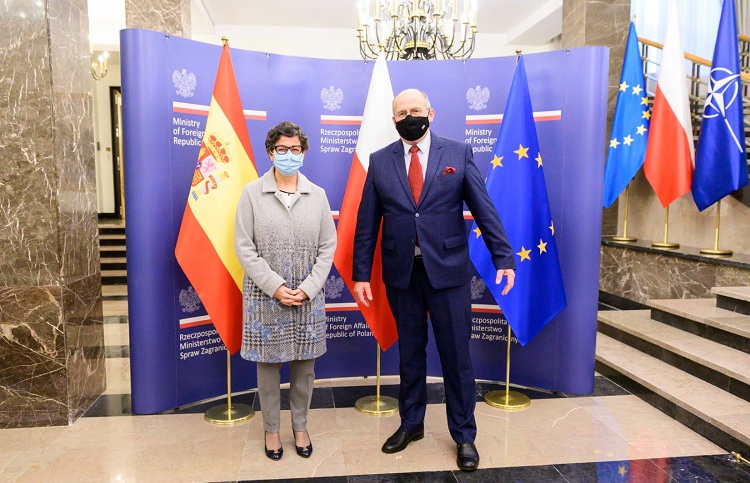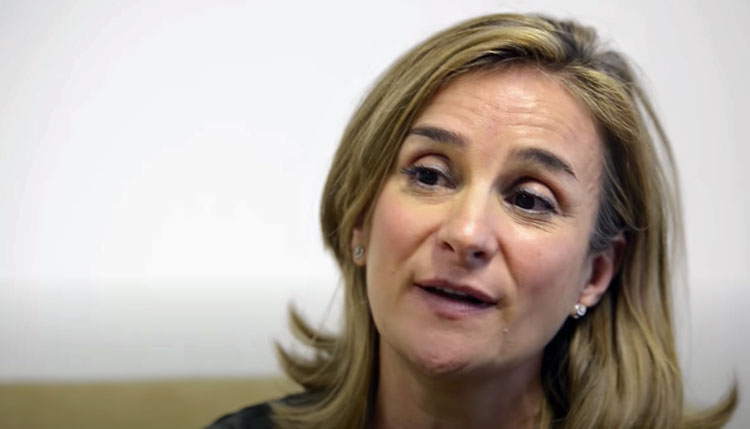The Diplomat
The Minister of Foreign Affairs, Arancha González Laya, and her Polish counterpart, Zbigniew Rau, announced yesterday in Warsaw that the next bilateral summit will take place in the first half of the year in Spain and will serve to boost strategic relations in the political, economic (with special attention to the recovery after COVID-19), cultural and military fields.
“Poland and Spain are not only partners, they are also friends”, the minister stated at the joint press conference with Rau. “The purpose of coming to Poland is to reinforce this bond, which is solid, but which we now want to strengthen and use in a more strategic way, and for that we have discussed the preparation of the next summit between Spain and Poland”, which will take place in the first half of 2021, four years after the last such meeting between the two countries.
At this meeting, she continued, “we will obviously want to highlight our economic and trade relations“. “There are more than 11,000 million euros of exchanges, Spain is the fifth largest investor in Poland and there is the commitment of our companies to be present in this country and generate wealth and create employment, for the benefit of Poland and also for the benefit of Spain”, continued González Laya, whose day in Warsaw began, precisely, with a breakfast meeting with Spanish businessmen in Poland.
Likewise, the minister explained, for both countries the summit will be “an opportunity” to “highlight their respective post-COVID recovery plans and to see how Spanish and Polish companies and investors can further strengthen their ties”. “There are important sectors where there are shared interests, such as renewable energies, infrastructures, technology, in which I believe we have great opportunities that we will be able to identify together in a business forum that will take place in the margins of the governmental meeting”, she said.
During the summit, continued González Laya, there will also be “a boost to cultural and educational relations”. “There are two Cervantes centers in this country that seek to respond to the great demand that exists in Poland to learn Spanish,” added the minister, who yesterday visited, precisely, the headquarters of the Instituto Cervantes in Warsaw accompanied by the director of the institution, Luis García Montero.
Likewise, “a boost will also be given to our relations in the field of security and defense“. “We are NATO partners, we are both working to redefine the strategic sense of the organization, but we also have a lot to boost at the bilateral level, including the defense industry, in which we have great shared interests”, explained González Laya.
For his part, Zbigniew Rau stated at the press conference that “both Poland and Spain want to make progress in the preparations for the intergovernmental consultations, tentatively scheduled, depending on the pandemic situation, for the first half of this year in Spain”, and discussed the preparations for the next edition of the parliamentary forum, which will take place in Poland and will precede the intergovernmental consultations. “Both formats will contribute significantly to strengthening the multidimensional strategic cooperation between our countries,” he said.
Frontex and Gibraltar
The minister’s day in Warsaw included a visit to the headquarters of the European Border and Coast Guard Agency (Frontex), where she greeted the agency’s Spanish staff. According to Frontex spokesman Chris Borowski, the minister spoke with the head of the operations division, Ana Cristina Jorge – the director of Frontex, Fabrice Leggeri, was not in Warsaw – about “a possible role in Gibraltar” when the UK and the EU conclude an agreement allowing the inclusion of the Rock in the Schengen area.
According to the principle of agreement on Gibraltar reached last December 31 between Spain and the UK, which will lay the groundwork for the negotiation of a treaty between the UK and the EU, the physical border will disappear from the fence and its functions will move to the port and the airport. Access controls to Gibraltar and the Schengen Area will be the responsibility of the Gibraltarian and Spanish authorities, respectively. However, although Spain will be responsible for the implementation of Schengen, it will do so through the assistance of Frontex for the first four years, after which the agreement will only be ratified if both parties so wish.







